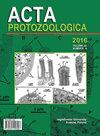A Huge Diversity of Metopids (Ciliophora, Armophorea) in Soil from the Murray River Floodplain, Australia. II. Morphology and Morphogenesis of Lepidometopus platycephalus nov. gen., nov. spec.
IF 1.2
4区 生物学
Q4 MICROBIOLOGY
引用次数: 12
Abstract
The morphology and morphogenesis of a new Australian metopid ciliate, Lepidometopus platycephalus nov. gen., nov. spec., were studied using live observation, various silver impregnation methods, scanning electron microscopy, and morphometry. The new genus is outstanding in having epicortical scales (lepidosomes) and a strongly flattened and distinctly projecting preoral dome. Diagnostic features of L. platycephalus include a small, reniform body carrying an elongated caudal cilium, about 11 ciliary rows, and an adoral zone composed of an average of 11 polykinetids. The morphogenesis of L. platycephalus matches data from other metopids in that (1) the body is drastically re-shaped, (2) the parental oral structures are reorganized but do not contribute to the daughter oral ciliature, (3) the opisthe’s adoral polykinetids originate pleurotelokinetally, (4) the opisthe’s paroral membrane is formed via re-arrangement of the posterior portion of the first two perizonal rows, and (5) the opisthe’s perizonal stripe is made by three parental perizonal rows and two dorsolateral ciliary rows. The morphogenetic data corroborate phylogenetic analyses in that caenomorphids are only superficially similar to metopids; metopids and clevelandellids are closely related; and litostomateans are the best candidates for a sister group of the metopid-clevelandellid assemblage within the SAL superclade.澳大利亚墨累河泛滥平原土壤中Metopids(Ciliophora,Armophorea)的巨大多样性。二、扁头鳞翅目动物的形态与形态发生。
采用活体观察、各种浸银方法、扫描电子显微镜和形态计量学方法,研究了澳大利亚一种新的壁面纤毛虫——鳞翅目鸭嘴兽的形态和形态发生。这个新属的突出特点是具有表皮鳞片(鳞皮体)和强烈扁平且明显突出的口前圆顶。鸭嘴兽的诊断特征包括一个肾形的小身体,携带细长的尾部纤毛,约11排纤毛,以及平均由11个多动丝组成的崇拜区。鸭嘴兽的形态发生与其他壁类动物的数据相匹配,因为(1)身体被彻底重塑,(2)父母的口腔结构被重组,但对女儿的口腔纤毛没有贡献,(4)阿片的腮腺膜是通过前两个环带行的后部的重新排列形成的,和(5)阿片环带条是由三个亲代环带行和两个背外侧纤毛行形成的。形态发生数据证实了系统发育分析,盲肠内啡肽仅在表面上与美托洛肽相似;墙面与墙面是密切相关的;和litostomateans是SAL超叶体内美托洛-克利维兰德组合姐妹群的最佳候选者。
本文章由计算机程序翻译,如有差异,请以英文原文为准。
求助全文
约1分钟内获得全文
求助全文
来源期刊

Acta Protozoologica
生物-微生物学
CiteScore
2.00
自引率
0.00%
发文量
8
审稿时长
>12 weeks
期刊介绍:
Acta Protozoologica - International Journal on Protistology - is a quarterly journal that publishes current and comprehensive, experimental, and theoretical contributions across the breadth of protistology, and cell biology of Eukaryote microorganisms including: behaviour, biochemistry and molecular biology, development, ecology, genetics, parasitology, physiology, photobiology, systematics and phylogeny, and ultrastructure. It publishes original research reports, critical reviews of current research written by invited experts in the field, short communications, book reviews, and letters to the Editor.
 求助内容:
求助内容: 应助结果提醒方式:
应助结果提醒方式:


